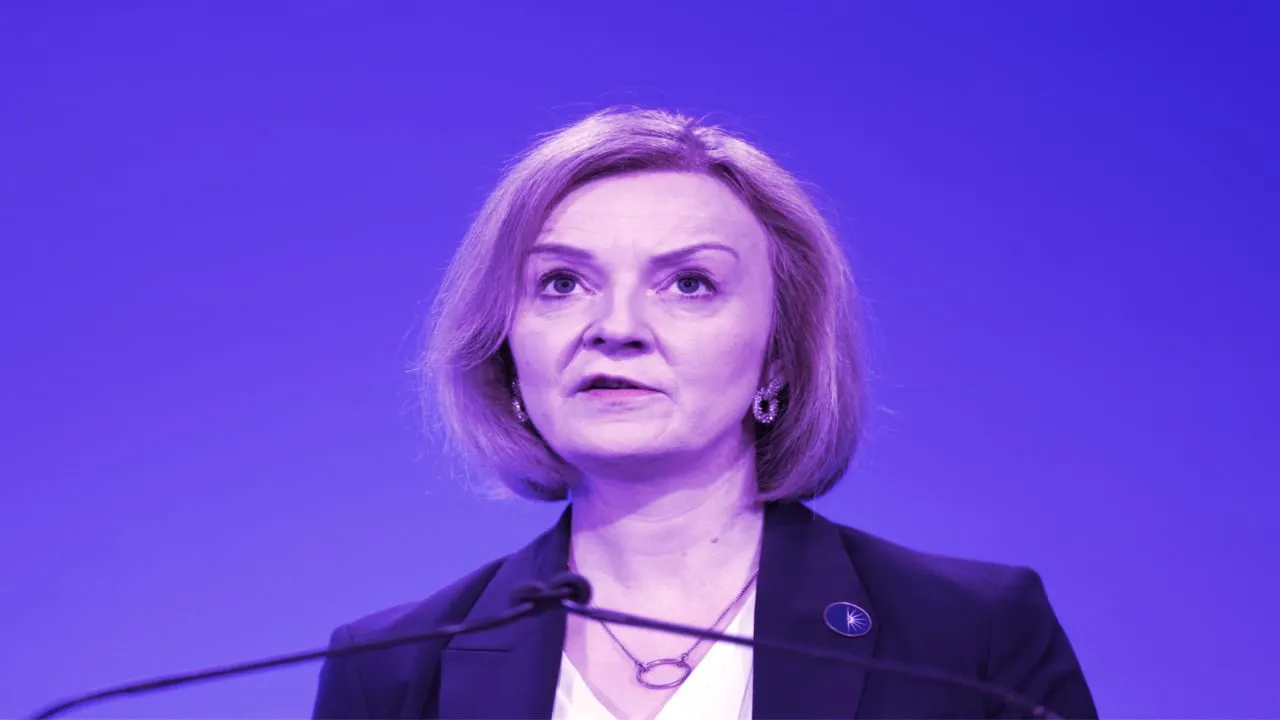Following a wave of scandals, Boris Johnson stepped down from the British premiership today and figuratively handed the keys to number 10 Downing Street to his former Foreign Secretary Liz Truss.
Truss officially takes office tomorrow, having beaten former Chancellor of the Exchequer Rishi Sunak in the leadership race.
While she hasn’t said much about crypto, her general beliefs about private enterprise indicate that she may take a hands-off approach to regulation.
Back in 2018, when Truss was Chief Secretary to the Treasury, she tweeted: “We should welcome cryptocurrencies in a way that doesn't constrain their potential. Liberate free enterprise areas by removing regulations that restrict prosperity.”
We should welcome #cryptocurrencies in a way that doesn't constrain their potential. Liberate free enterprise areas by removing regulations that restrict prosperity. #PolicyExchange #futureoffreedom #shakeup
— Liz Truss (@trussliz) January 30, 2018
Shortly after the resignation of British PM Theresa May in 2019, Truss supported Johnson’s leadership campaign and he duly appointed her Secretary of State for International Trade and President of the Board of Trade.
While serving in these roles, Truss launched a digital trade network in 2020 and said at the time that she wanted to “create great opportunities in areas such as blockchain.”
She further elaborated: “We want to achieve a world-leading data and digital agreement, underwriting data flows but also dealing with issues like blockchain and artificial intelligence, thereby making sure that we and the US are leading the world and able to share these economic opportunities.”
Recently, Truss has been thinner on crypto promises than her fellow Conservative Party frontrunner Rishi Sunak. There are also several priorities that voters would rather see her tackle first, particularly rising energy prices and a cost of living crisis.
However, she has promoted herself as strongly pro-business and pro-privatization and has promised businesses tax cuts to help them weather the economic storm.
Crypto exchange Luno, which is headquartered in London, is one company that welcomes the changeover.
Thomas Tudehope, Luno’s Global Head of Public Policy, told Decrypt that his firm “looks forward to working with Ms. Truss and her team to design a regulatory framework for crypto which will boost economic growth, create thousands of jobs and protect consumers.’
He added that “there is an urgent need to develop and implement” such a framework to enable “British firms to plan with the certainty that is required if we are to position the country as a world-leader in the digital asset ecosystem.”
Britain prepares for crypto
When Sunak was in office as Britain’s Finance Minister, the government seemed especially keen to embrace cryptocurrencies, so much so that back in April, it announced plans to become a “global crypto asset technology hub.”
At the time, Sunak said in a prepared statement: “It’s my ambition to make the U.K. a global hub for crypto asset technology, and the measures we’ve outlined today will help to ensure firms can invest, innovate, and scale up in this country.”
Sunak’s primary proposal toward crypto regulation involved regulating stablecoins “as a recognized form of payment.”
The British government also announced that it was working with the Royal Mint—the official manufacturer of Britain’s coins—to produce an NFT that was initially going to be issued by summer, although Fall is almost here, and there have been no updates.
Consumer protections take center stage
Back in January, Britain published plans to protect consumers from misleading crypto commercials.
The government said it was bringing all crypto advertising in line with existing financial promotions legislation to “increase consumer protection while encouraging innovation.”
This means that crypto ads need approval by the Financial Conduct Authority (FCA) or the Prudential Regulation Authority (PRA), or a firm licensed by either of those.
In March, the Advertising Standards Authority (ASA) issued a “red alert” Enforcement Notice to over 50 crypto companies, warning them to bring their advertising in line with a new set of guidelines. The ASA coordinated closely with the FCA to distribute the notice.

